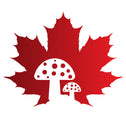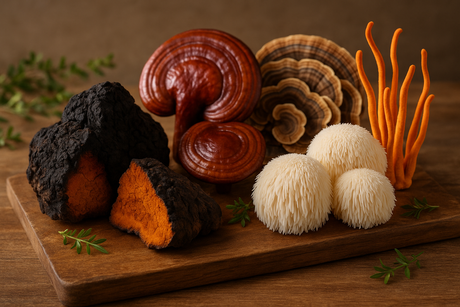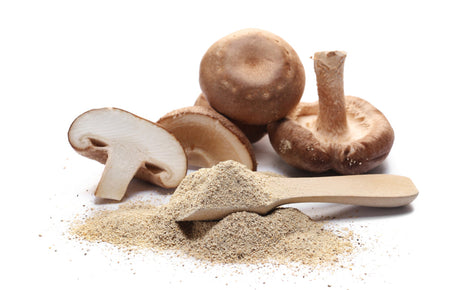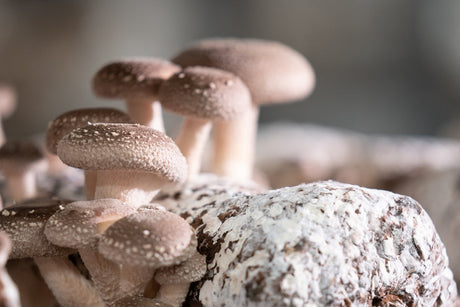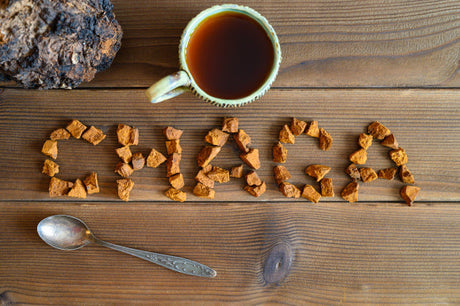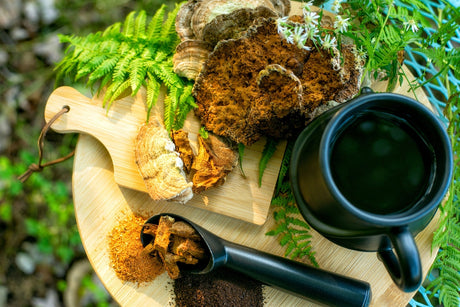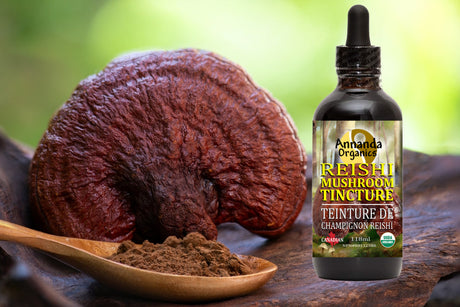What is Chaga Mushroom?
Chaga Mushroom grows on Birch trees in cold climates throughout North America, Russia, and the Northern hemisphere. Chaga mushroom Inonotus Obliquus looks like burnt charcoal or a encrusted black formation on birch trees.

What is Chaga Tea Made From?
Simply put, people make chaga tea by drying and milling chaga mushroom.
The different grinds of the mushroom offer different options for brewing. Broken into pieces or chunks, ground to a course consistently similar to coffee called tea-cut, or milled into a powder.
- chunks
- Tea
- Powder
- fine powder
- Extracted Powder
- Traditional tea bag
- chaga extract
The concept of extracted powder refers to the process of freeze drying. Producers apply the same techniques used to make instant coffee to create instant mushroom powders.
Capsules and extracted powders are convenient, but lose most of their health benefits during production.
Grinding chaga into tea or powder using a coffee grinder may damage the blades.
Benefits of Chaga Tea
Mushrooms help create healthy blood cells that are important for fighting bacteria and viruses.
The potential health benefits include helping to reduce inflammation, relieve pain, prevent heart disease and improves cholesterol levels. This also helps with controlling high blood pressure, blood sugar levels and blood clotting and can act as a natural blood thinner.
Beta glucans in mushrooms help to boost the immune system, fighting infections and easing pain, like in rheumatoid arthritis.
Studies show that inonotus obliquus boasts some of the highest O.R.A.C. levels on Earth. Helping to flush toxins, radiation, heavy metals and other free radicals out of our body.
The mushroom contains an enzyme called Superoxide Dismutase that can fight cancer cells and helps greatly with fighting cancer.
You can explore more benefits of consuming chaga on our benefits page.
Can You Take Too Much Chaga?
Taking too many minerals every day for a long time can put too much strain on the liver and kidneys. Choose quality over quantity is the best way to manage your dosage.
What Does Chaga Tea Taste Like? A Unique Taste in Nature
Birch Chaga tastes mild and earthy, with a hint of sweet vanilla taste as is quite pleasant tasting.
If it tastes bitter, it may be because of improper drying or not being from the Birch tree.
Can You Eat Chaga?
Despite having a mild taste is it not recommended you eat it raw. Chitin protects the cell walls so you need to extract the compounds from the mushroom with hot water to obtain the full health benefits.
Indigenous tribes used to suck on pieces of chaga to help with toothaches or headaches.
Health Canada recommends to limit your daily intake of raw mushroom to 3.6g per day.
How often should you drink Chaga Tea?
Limit your intake to the recommended two cups per day. Take one cup in the morning and a second cup late afternoon.
Do not take later in the evening as it may affect your sleep.
Does Chaga have Caffeine?
The mushroom does not contain caffeine. The tannins in the melanin release the dark rich color when brewing.
The mushroom expands the arteries and increases the heart's pumping action. This simulates the effects of caffeine but without any side effects.
Drinking the tea daily promotes endurance and an overall sense of well being.
Does Chaga help you lose weight?
Mushrooms can boost energy, vitality, and help control appetite and weight gain.
Your daily intake of mushroom tea supports the digestive process allowing for improved nutritional absorption. More efficient nutritional intake means that you feel fuller faster.
Herbal tea, green tea and chaga tea contain no calories and help curb your appetite. They are a good option for those looking to manage their weight. Enjoying these teas can be a helpful way to control your hunger.
Chaga and Pregnancy
Pregnant women can consider it a great source of vitamins, minerals, and plant nutrients. These nutrients act like a super vitamin.
Pregnant women should only drink one cup per day and avoid alcohol-based tinctures or extracts.
How Long Does it Last?
Chaga Mushroom tea can last a long time because of its mineral content.
You can refrigerate your brewed tea for up to two weeks or freeze it for up to six months for long term storage.
Reuse it several times by storing the used portions in the freezer in between brews.
Chaga Tea Shelf Life
Like most tea's, whether it is in small pieces, chunks or powder, it can expire and lose potency if not stored properly. The mushroom does lose its potency when exposed to direct sunlight and constant air circulation. It does become less potent as it oxidizes over time.
You can extend the shelf life of chaga for up to two years if stored properly.
Storing Chaga
Store the mushroom in an airtight container, food-grade pouch, or glass jar and keep it in a dark cupboard.

Consume fresh wild chaga within 6 months to a year to get the most health benefits. Fresh is always best Fresh is always best in our view and reduces the chances of spoilage or any unwanted side effects.
Magic mushrooms, magic mushroom tea, psilocybin mushrooms, shroom tea, psilocybe cubensis, psychedelic mushrooms have nothing to do with chaga




